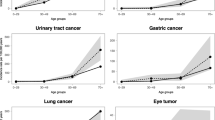Abstract
Evaluation of familial colorectal cancer referral can assist in the planning of future cancer surveillance. The aim of the study is to assess colorectal cancer referral pattern to our regional genetics service. Hospital computer records and/or department referral books were used to identify cases referred to the regional genetic service during a 10-year period (1992–2001 inclusive). All files were reviewed along with associated demographic data, risk assessments, referral details, results from mutation testing and screening recommendations. In terms of result, a total of 1,100 family files were reviewed (Familial Adenomatous Polyposis families were in a separate register). The number of referrals showed a 10-fold increase over the 10 years. 171 (15.6%) of families met the Amsterdam criteria II were classified as high-risk, 589 (53.5%) families were classified as moderate-risk and 337 (31.0%) as average or low risk. 22.9% families were referred with inaccurate cancer history. Sixty-one families have been identified with mismatch repair mutations. 56.8% of referred individuals were recommended to have regular colonoscopy ranging from 18 monthly to 5 yearly depending on their risks. In conclusion, there has been a 10-fold increase in individuals with suspected hereditary bowel cancer referred to the North West Regional Genetics Service in the last ten years. Genetic assessment may reduce the number of low-risk individuals and those who were found not to be mutation carriers from having unnecessary colonoscopic screening. Thus genetic risk assessment should precede the initiation of regular endoscopic screening.




Similar content being viewed by others
References
Parkin DM, Pisani P, Ferlay J (1993) Estimates if the worldwide incidence of eighteen major cancers in 1985. Int J Cancer 54:594–606
The Cancer Research UK Website. http://www.cancerresearch.org.uk/aboutcancer/statistics/cancerstatreport/ [1 December 2003]
Hayne D, Brown RSD, McCormack M et al (2001) Current trends in colorectal cancer: site, incidence, mortality and survival in England and Wales. Clin Oncol 13:448–452
Lynch HT, Smyrk T (1998) An update on Lynch syndrome. Curr Opin Oncol 10(4):349–356
Vasen HF, Watson P, Mecklin JP et al (1999) New clinical criteria for hereditary nonpolyposis colorectal cancer (HNPCC, Lynch syndrome) proposed by the International Collaborative group on HNPCC. Gastroenterology 116(6):1453–1456
Jarvinen HJ, Aarnio M, Mustonen H et al (2000) Controlled 15-year trial on screening for colorectal cancer in families with hereditary nonpolyposis colorectal cancer. Gastroenterology 118(5):829–834
de Vos tot Nederveen Cappel WH, Nagengast FM, Griffioen G et al (2002) Surveillance for hereditary nonpolyposis colorectal cancer: a long-term study on 114 families. Dis Colon Rectum 45(12):1588–1594
Vasen HFA, Watson P, Mecklin J-P, Lynch HT, ICG-HNPCC (1999) New clinical criteria for hereditary nonpolyposis colorectal cancer (HNPCC, Lynch syndrome) proposed by the international collaborative group on HNPCC. Gastroenterology 116:1453–1456
Hodgson S, Maher ER (1999) A practical guide to human cancer genetics, 1st edn. Cambridge University Press, Cambridge
Hildreth NG, Kelsey JL, LiVolsi VA et al (1981) An epidemiologic study of epithelial carcinoma of the ovary. Am J Epidemiol 114(3):398–405
Rodriguez-Bigas MA, Boland CR, Hamiliton SR et al (1997) A National Cancer Institute Workshop on Hereditary Nonpolyposis Colorectal Cancer Syndrome: meeting highlights and Bethesda guidelines. J Natl Cancer Inst 89:1758–1762
Liu B, Parsons R, Papadopoulos N et al (1996) Analysis of mismatch repair genes in hereditary non-polyposis colorectal cancer patients. Nat Med 2(2):169–174
Taylor CF, Charlton RS, Burn J et al (2003) Genomic deletions in MSH2 or MLH1 are a frequent cause of hereditary non-polyposis colorectal cancer: identification of novel and recurrent deletions by MLPA. Hum Mutat 22(6):428–433
Nakagawa H, Hampel H, de la Chapelle A (2003) Identification and characterization of genomic rearrangements of MSH2 and MLH1 in Lynch syndrome (HNPCC) by novel techniques. Hum Mutat 22(3):258
Wonderling D, Hopwood P, Cull A et al (2001) A descriptive study of UK cancer genetics services: an emerging clinical response to the new genetics. Br J Cancer 85(2):166–170
Moynihan C (1998) Theories in health care and research: theories of masculinity. BMJ 317(7165):1072–1075
Mak T, Lalloo F, Evans DG et al (2004) Molecular stool screening for colorectal cancer. Br J Surg 91(7):790–800
Ahlquist DA, Skoletsky JE, Boynton KA et al (2000) Colorectal cancer screening by detection of altered human DNA in stool: feasibility of a multitarget assay panel. Gastroenterology 119(5):1219–1227
Glanz K, Grove J, Lerman C et al (1999) Correlates of intentions to obtain genetic counseling and colorectal cancer gene testing among at-risk relatives from three ethnic groups. Cancer Epidemiol Biomarkers Prev 8(4 Pt 2):329–336
Mitchell RJ, Brewster D, Campbell H et al (2004) Accuracy of reporting of family history of colorectal cancer. Gut 53(2):291–295
Katballe N, Juul S, Christensen M et al (2001) Patient accuracy of reporting on hereditary non-polyposis colorectal cancer-related malignancy in family members. Br J Surg 88(9):1228–1233
Church J, McGannon E (2000) Family history of colorectal cancer: how often and how accurately is it recorded? Dis Colon Rectum 43(11):1540–1544
Aitken J, Bain C, Ward M et al (1995) How accurate is self-reported family history of colorectal cancer? Am J Epidemiol 141(9):863–871
Syngal S, Fox EA, Eng C et al (2000) Sensitivity and specificity of clinical criteria for hereditary non-polyposis colorectal cancer associated mutations in MSH2 and MLH1. J Med Genet 37:641–645
Author information
Authors and Affiliations
Corresponding author
Rights and permissions
About this article
Cite this article
Mak, T., Speake, D., Lalloo, F. et al. Familial colorectal cancer referral to regional genetics department—a single centre experience. Familial Cancer 6, 81–87 (2007). https://doi.org/10.1007/s10689-006-9108-6
Received:
Accepted:
Published:
Issue Date:
DOI: https://doi.org/10.1007/s10689-006-9108-6




